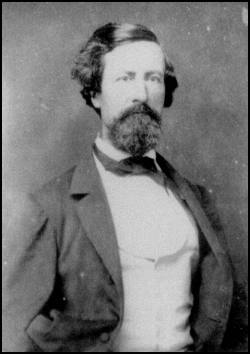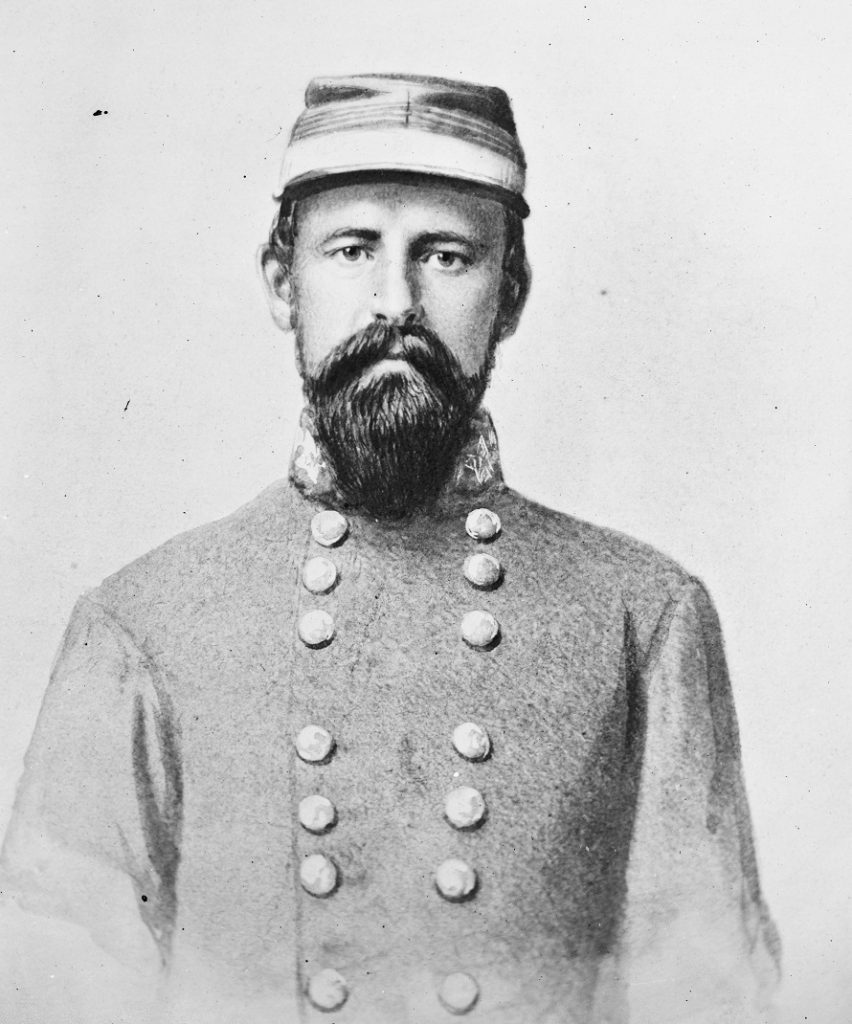Challenging the Myth of “Hold at All Costs” the City of Vicksburg
ECW welcomes guest author John Gillespie.
It has become a common belief, almost canonical, in Vicksburg historiography that Jefferson Davis ordered John C. Pemberton to “hold Vicksburg at all costs.” However, the historical record does not support this assertion. The most common source of this misinterpretation is Davis’s telegram of May 7, which states, “To hold both Vicksburg and Port Hudson is necessary to a connection with the Trans-Mississippi.” But it is a mistake to interpret this as an order. Rather, it is merely a statement of fact and, when taken in context, it clearly shows it is a response to Pemberton’s May 2 telegram suggesting that Port Hudson and Grand Gulf be evacuated.

Davis’s dispatch of May 7 must be examined properly. On April 16, the Federal Navy passed the batteries at Vicksburg and interposed itself between Vicksburg and Port Hudson. Consequently, Pemberton had to admit to Davis on May 1 that the “enemy’s success in passing our batteries has completely changed the character of defense.”
As the battle of Port Gibson raged on, Pemberton realized that a successful Federal landing would threaten Jackson and cut off Vicksburg and Port Hudson from the east. He understood that defeating the enemy required uniting all his available forces, which necessitated evacuating Port Hudson. Pemberton proposed this idea to President Davis by suggesting, “Port Hudson and Grand Gulf should be evacuated, and the whole force concentrated for the defense of Vicksburg and Jackson.”
However, Davis’s response does not rise to the level of a military order. At most, it is a statement of policy or strategic guidance. Military orders are prescriptive and rely on modal verbs (will, shall, must) to achieve the legal sufficiency of a lawful order. The modal verb may sometimes be omitted if the verb itself implies action: “You will move tonight,” or “Move tonight” are equally sufficient to constitute a lawful order.
An analysis of Pemberton’s operations while commanding the Department of Mississippi and East Louisiana (DMEL) must begin with an understanding of the orders he received from the government when he was appointed to command in September 1862. An examination of the order from Secretary of War G.W. Randolph makes no mention of holding Vicksburg “at all costs.” It defines the geographic boundaries of the department as encompassing “the State of Mississippi and so much of Louisiana as lies east of the Mississippi River,” with “the successful defense of those States as the first and chief object of your command.” The directives included that he:
– Will organize the troops in his department and prepare them for the field.
– Will avail himself of any favorable opportunity to attack New Orleans.
– Will act in concert with Maj. Gen. Richard Taylor by communicating with him as speedily as possible.
– Will coordinate with Taylor on a joint plan of operations for the defense of the river and the capture of New Orleans.
– Will report directly to the War Department.

Any order from Davis commanding him to hold Vicksburg “at all costs” would have provided John Pemberton an absolute, unimpeachable defense of his actions. But no such order existed, and he knew it. If Pemberton had such an order when he received Johnston’s May 13 dispatch recommending that he, “if practicable, come up on his rear at once,” his reply to Johnston would have stated he had explicit orders to “hold Vicksburg at all costs.” Furthermore, if the order existed, a council of war would not have been necessary and could not have advised any course of action other than to comply with Davis’s directive.
After receiving Johnston’s dispatch on May 17, advising, “if not too late, evacuate Vicksburg and its dependencies, and march to the northeast,” Pemberton called another council of war. After the council affirmed his position that the army could not be withdrawn from Vicksburg, he responded on May 18, saying, “I conceive it to be the most vital point in the Confederacy.” Later, in his official report, he continued, “I believed it in my power to hold Vicksburg. I knew and appreciated the earnest desire of the Government and of the people that it should be held.” Decades later, defending himself against accusations made by Joseph Johnston, he returned to his position that he conceived it to be the most vital spot in the Confederacy and determined it was his duty to hold it at all costs.
The record is clear: Even John Pemberton did not believe he had received an order to defend Vicksburg “at all costs.” The decision to hold it was entirely his own. A close reading of the contemporaneous dispatches, his official report and, decades later, his response to Joseph Johnston’s criticism (unpublished until 1998), unequivocally supports this. The first instance occurred on May 15 when Pemberton called the first of his councils of war. If he possessed an imperative order to hold Vicksburg, there would have been no need for the council. Even if he had such an order and convened a council, no subordinate general would advise anything other than adherence to that directive.

After receiving Gen. Johnston’s order on May 17 to evacuate Vicksburg, Pemberton replied on May 18, “I have decided to hold Vicksburg as long as possible,” and “I still conceive it to be the most important point in the Confederacy.” If that positive order existed, he would have asserted in the reply dispatch to Johnston, “I have decided to hold Vicksburg as the government conceives it to be the most important point in the Confederacy.”
In his official report, Pemberton stated he understood Johnston’s directive to move east, unite with him, and defeat the enemy. However, he postponed compliance with Johnston’s order because he “knew and appreciated the earnest desire of the Government and of the people that it should be held,” yet he stopped short of implying “at all costs.” An “earnest desire” does not equate to a lawful order. He recounted regretting the forward movement made under pressure, which countered his previously intended plans, stating his plans prioritized “the safety of Vicksburg as paramount; under no circumstances could I abandon my communications with it.”
In “Compelled to Appear in Print,” Pemberton came as close as he ever did to claiming he was ordered to hold Vicksburg at all costs. He wrote, “I was expected by the government and people of the Confederate States to hold Vicksburg and Port Hudson at any every cost.” Yet, expectations are not orders and do not equate to a directive to “hold at all costs.” That belief constrained Pemberton from considering any other course of action and manifested itself in his decision-making throughout the last portion of active field operations.
When he realized he could not repel the landing, he knew he would need all the troops he could collect. On May 1 he requested “large re-enforcements should be sent me from other departments,” and he informed Davis that Port Hudson would be cut off.
On May 2 he received a dispatch from Secretary of War Seddon informing him, “Heavy re-enforcements will be sent from General Beauregard’s command.” That telegram undoubtedly pleased Pemberton and gave assurance that the government would assist. Responding on May 2 and not having received a response to his notional plan, he floated the idea of evacuating Port Hudson. On May 3 he felt confident enough to report to Davis that with the reinforcements promised he thought, “we will be alright.”
His optimism was short-lived as on May 4 he received a dispatch from Seddon that despite being ordered to send ten thousand men, “General Beauregard doubts his ability to part with more than the 5,000.” Pemberton was counting on those ten thousand men, and with the word that only half would be on its way, he decided to take the chance and immediately telegraphed Gardner in Port Hudson that he “must come and bring with you 5,000 infantry” to replace the reinforcements lost to him from the east.

Before Gardner could move far from Port Hudson, Pemberton received Davis’s May 7 response. Pemberton, always sensitive to Davis’s role as his superior, lost his nerve, and his one attempt at initiative disappeared. On May 8, he telegraphed Gardner to “return with 2,000 troops to Port Hudson, and hold it to the last. President says both places must be held.” Neither of which Davis said. If in the absence of Pemberton’s other blunders over the next two weeks, a major general and 2,000 more men had the real potential to change the outcome and fortunes of war for John Pemberton.
Ultimately, the Federal army rendered moot whether he received an order to hold Vicksburg at all costs; John Pemberton believed it was his duty to do so.
Historians should understand this perspective as it accurately frames Confederate operations during the Inland campaign.
John Gillespie is a native of Raymond, Mississippi and a retired Colonel, USAF. He is a graduate of both USAF Air War College and the United States Army War College, Carlisle Barracks, Pennsylvania.
Works Cited
The War of the Rebellion: A Compilation of the Official Records of the Union and Confederate Armies. Vol. 24, pts. 1-3. Washington, D.C.: U.S. Government Printing Office, 1886-87, 1899.
Smith, David M., ed. Compelled to Appear in Print: The Vicksburg Manuscript of General John C. Pemberton. Cincinnati: Ironclad Publishing, 1999.
Pemberton would have been even more despised if he had given up Vicksburg without a fight. Not sure if he had a path to victory there. Any comments from others?
Excellent analysis.
Really good investigation into facts, thanks. Council of War’s – Stonewall Jackson died 5/10/63. By May 17 it was too late for Pemberton to ask TJ what he thought of Council of War’s.
What is the score on Council of War’s. Jackson at Winchester, that was a doh!. Bragg at Chickamauga, that was a doh!. Rosecrans at Stones River, a win. Meade at Gettysburg day 2 – a win. Meade at Williamsport – doh! Robert E Lee at Appomattox – not much to say there.
John … nice analysis, i enjoyed reading it … although I can see how Pemberton — not the CSA’s brightest 3 star — might have interpreted Davis’s last missive as the 19th century version of a commander’s intent or a mission order –“To hold both Vicksburg and Port Hudson is necessary to a connection with the Trans-Mississippi.” Reading this it’s easy to see how Pemberton might interpret it to mean Davis’s intentions are for me to hold Vicksburg … and Davis, of course, bears responsibility as well … that 7 May telegram is not very clear. Thanks!
Thank you Mark. Looks like you have experience with JP 5-0 Joint Planning Process.